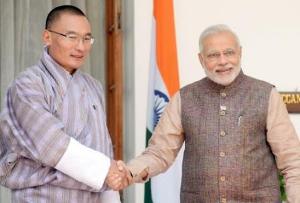 Thimphu, Jun 15: As Prime Minister Narendra Modi Sunday began a two-day visit to Bhutan, the Bhutanese leadership has described the Indian leader as "a friendly person and well disposed towards Bhutan" and as one who "gives a sense of purpose and hope".
Thimphu, Jun 15: As Prime Minister Narendra Modi Sunday began a two-day visit to Bhutan, the Bhutanese leadership has described the Indian leader as "a friendly person and well disposed towards Bhutan" and as one who "gives a sense of purpose and hope".
Bhutanese Prime Minister Tshering Tobgay said that even though there are no specific issues to discuss during the meeting with Modi from Bhutan's side, all commitments made and the generous support that the government receives from India will be discussed, according to The Bhutanese daily.
Tobgay described the Indian prime minister as: "He is a friendly person and obviously very knowledgeable and well disposed towards Bhutan. He holds our kings in very high esteem. He is very aware of the details of the India-Bhutan relationship and overall gives a sense of purpose and hope."
Tobgay, in response to a question on hydropower, said that both the prime ministers would discuss the situation "which is good as of now".
Modi "had expressed his concerns over the delay in some hydropower projects. A concern which has gone well in Thimphu, as the government is anxious to start and complete the mega projects at the earliest dates possible," The Bhutanese quoted Tobgay as saying.
He said that "Bhutan looks forward to strengthening the economic partnership with India and to strengthen the Bhutanese economy. Tobgay said that the Indian assistance, in the form of Nu 45 bn or Rs.4,500 crore for Bhutan's 11th Plan would translate into more economic activities and growth for Bhutan".
While he was in Delhi last month for Modi's swearing in, Tobgay had met the chairman of the Confederation of Indian Industry (CII) and they had agreed that they should exchange visits and draw up a plan of action to encourage investments from India into Bhutan, he said.
According to him, a CII delegation would be coming to Bhutan, which already has a framework in place in the form of the Economic Development Policy.
He said that Indian companies are already investing in Bhutan and that Bhutan needs to fast track its work with the Indian private sector, The Bhutanese said.
Tobgay said Bhutan has made all arrangements to welcome Prime Minister Modi warmly, in keeping with the good ties between the two countries. He said the visit would take the friendship between two countries to further heights.
In an earlier interview to the daily, Tobgay had declared Modi's decision to visit Bhutan as being historic. He said that Bhutan was extremely happy and proud of the fact that Modi has chosen to visit Bhutan first, when not only the SAARC region, but the entire world was watching.
According to a Bhutanese foreign ministry press release, the visit is highly significant as it is Prime Minister Modi's first visit abroad after his swearing-in ceremony as the prime minister of India. The release says that the visit will further strengthen the unique and special ties of friendship and cooperation between Bhutan and India, said The Bhutanese.




Comments
Add new comment